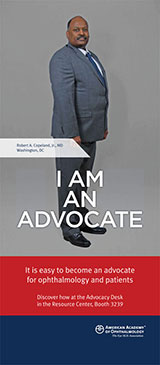 I believe that advocacy comes naturally for everyone. We advocate daily for our patients and individuals less fortunate, who need our intervention to make a situation more palpable. To advocate for our ophthalmology profession is an honor. When we advocate, we are first advocating for our patients’ safety and well-being. We must recognize the importance of advocacy in our life’s work as well. It is important to be involved in advocacy in order to protect what we do and the years of continual learning we undertake to be competent ophthalmologists. We cannot shy away from our lifelong commitment to patients and learning.
I believe that advocacy comes naturally for everyone. We advocate daily for our patients and individuals less fortunate, who need our intervention to make a situation more palpable. To advocate for our ophthalmology profession is an honor. When we advocate, we are first advocating for our patients’ safety and well-being. We must recognize the importance of advocacy in our life’s work as well. It is important to be involved in advocacy in order to protect what we do and the years of continual learning we undertake to be competent ophthalmologists. We cannot shy away from our lifelong commitment to patients and learning.
I first started active advocacy by attending the Academy’s Mid-Year Forum and Congressional Advocacy Day. I enjoyed going on Capitol Hill to advocate for patients and the issues that were affecting the ophthalmology profession. Following that experience, I made the decision as chairman of the Department of Ophthalmology at Howard University to have all of my ophthalmology residents attend the Mid-Year Forum; this helps familiarize them with the issues that ophthalmology is facing now and possibly in the near future. In all the decisions I made as chairman, this was one the best because I now see my former residents taking up active roles in advocacy. In closing, if you do not advocate for what is morally right, then others will determine our fate.
Robert A. Copeland Jr., MD, is a professor and chairman of the Department of Ophthalmology at the Howard University College of Medicine and Howard University Hospital in Washington, D.C.